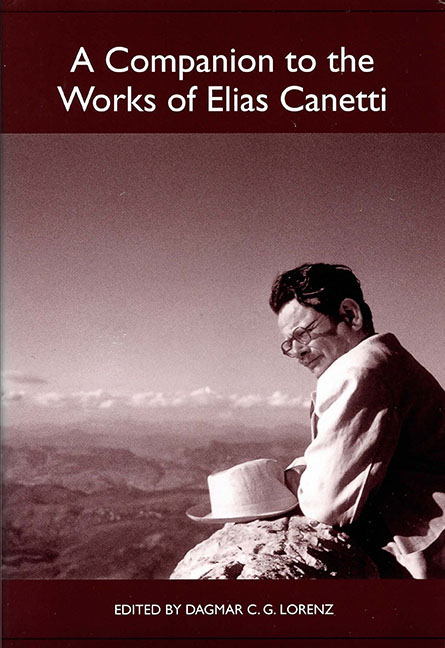Book contents
- Frontmatter
- Dedication
- Contents
- Canetti's Principal Works
- Abbreviations of Works Frequently Cited
- Introduction
- Canetti's Global Significance
- Writing and Language
- “The Deeper Nature of My German”: Mother Tongue, Subjectivity, and the Voice of the Other in Elias Canetti's Autobiography
- Elias Canetti's Attitude to Writers and Writings
- Canetti and the Question of Genre
- The Works: Themes and Genres
- Philosophy and Social Thought
- Historical Contexts
- Works Cited
- Notes on the Contributors
- Index
Elias Canetti's Attitude to Writers and Writings
from Writing and Language
Published online by Cambridge University Press: 28 April 2017
- Frontmatter
- Dedication
- Contents
- Canetti's Principal Works
- Abbreviations of Works Frequently Cited
- Introduction
- Canetti's Global Significance
- Writing and Language
- “The Deeper Nature of My German”: Mother Tongue, Subjectivity, and the Voice of the Other in Elias Canetti's Autobiography
- Elias Canetti's Attitude to Writers and Writings
- Canetti and the Question of Genre
- The Works: Themes and Genres
- Philosophy and Social Thought
- Historical Contexts
- Works Cited
- Notes on the Contributors
- Index
Summary
For Idris Parry
Elias Canetti was a most learned man, a genuine poeta doctus. He was a compulsive book buyer, who owned more books than he was able to read, and an ardent reader, who was always looking forward to reading more. He was, however, far too interested in other people, as any great writer has to be, to be a mere bookworm. Yet he was well aware of all writers’ indebtedness to the tradition of books. Therefore, this essay will seek to explore his account of what other writers’ work meant to him. Canetti's own writings will inevitably provide most of the evidence for his views. But I also shall quote from or refer to letters which he wrote to Idris Parry, Professor Emeritus of German at the University of Manchester. Parry, who is a perceptive Canetti critic and scholar and knew Canetti well, has kindly put these extracts at my disposal. I shall also quote or refer to what Canetti wrote or said to me. I saw him on several occasions, not only in England, but also in Switzerland, mainly in the house of my close Zurich friend, Dr. Hans-Ruedi Müller-Steiger, who became his doctor on my recommendation, and in whom he had “ein unerschütterliches Vertrauen,” as he wrote to me on December 26, 1981.
Canetti had a remarkable gift for conjuring up the world in which writers lived and for portraying what they were like as people. His portrayal of Hermann Broch proves it. He also knew how to cast a spell. Although I spent my formative years in Ireland, where the art of conversation is much, often even dizzily, practised, I never came across anyone whose conversation was so completely enthralling. When I first met him, he had come to Bristol at my invitation to read from his work, followed by a university dinner. Afterwards we went into the street where I was surprised to be in Bristol and not in the Vienna of the thirties that he had brought to life during the evening. We also talked about Arthur Schnitzler and Hugo von Hofmannsthal. Whereas he spoke of Schnitzler with respect but detachment, he dismissed Hofmannsthal, much to my surprise, as insubstantial.
- Type
- Chapter
- Information
- A Companion to the Works of Elias Canetti , pp. 61 - 88Publisher: Boydell & BrewerPrint publication year: 2004

